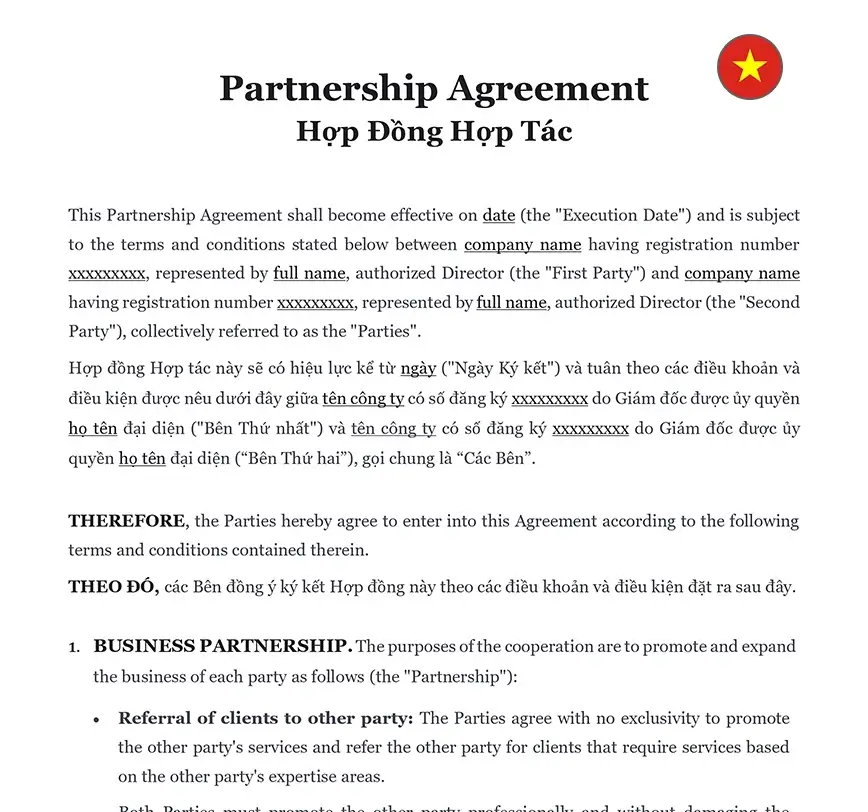Understanding the Business Partnership Structure
A business partnership involves two or more individuals or entities working together towards a common business goal. This structure offers flexibility and shared responsibility but also requires clear agreements to avoid disputes. There are several types of business partnerships in Vietnam, including general partnerships, limited partnerships, and joint ventures. Each type has distinct characteristics and legal implications. For instance, in a general partnership, all partners share unlimited liability, meaning their personal assets can be used to settle business debts. In contrast, a limited partnership includes both general partners, who have unlimited liability, and limited partners, whose liability is capped at their investment amount. Understanding these differences is crucial for selecting the right partnership structure that aligns with your business goals and risk tolerance. Draft clear partnership terms with our Partnership Agreement template.
Importance of a Partnership Agreement
A Partnership Agreement is essential for ensuring the smooth operation and success of a business partnership. Here are the key reasons why a comprehensive Partnership Agreement is crucial:
Outlines Roles, Responsibilities, and Expectations: A Partnership Agreement clearly defines the roles, responsibilities, and expectations of each partner, ensuring everyone knows their duties and obligations.
Prevents Misunderstandings and Conflicts: This legally binding contract helps prevent misunderstandings and conflicts by explicitly stating terms such as profit sharing, decision-making processes, and procedures for resolving disputes.
Ensures Legal Compliance: Using our expertly crafted templates, you can ensure that your Partnership Agreement is comprehensive and compliant with Vietnamese laws.
Inclusive Drafting Process: It’s important to involve all partners in the drafting process to ensure that everyone’s interests and concerns are addressed.
Provisions for Future Changes: The agreement should include provisions for future changes, such as adding new partners or modifying the partnership structure.
Establishes a Solid Foundation: By having a well-drafted Partnership Agreement, you can establish a solid foundation for a successful and harmonious business partnership.
ℹ️ Consider also having a Service Agreement in place if your partnership engages with external service providers, ensuring all service terms are clearly defined and agreed upon.
Key Elements of a Business Partnership Agreement
A well-drafted Partnership Agreement should include:
| ➤ Partner Contributions: Details of each partner’s financial, physical, or intellectual contributions. It should specify the initial capital each partner is investing, the assets being contributed, and any ongoing financial commitments. Clear documentation of contributions helps ensure fairness and transparency. |
| ➤ Profit and Loss Sharing: Clear terms on how profits and losses will be distributed among partners. This section should define the percentage of profits and losses each partner will receive, based on their contributions and agreed-upon terms. Clarity in this area prevents disputes and ensures equitable treatment of all partners. |
| ➤ Decision-Making Authority: Procedures for making business decisions and the level of authority each partner holds. This includes specifying who has the final say in various types of decisions, whether unanimous consent is required for major decisions, and how disputes will be resolved. Clear decision-making processes enhance operational efficiency and prevent conflicts. |
| ➤ Dispute Resolution: Methods for resolving conflicts between partners. This can include mediation, arbitration, or legal action, and should outline the steps to be taken when a dispute arises. Having a predefined dispute resolution mechanism helps maintain harmony and minimizes disruptions to business operations. |
| ➤ Exit Strategy: Terms for the departure of a partner and the continuation of the business. This section should detail the procedures for a partner’s voluntary or involuntary exit, buyout provisions, and the valuation method for the departing partner’s share. A clear exit strategy protects the interests of all partners and ensures business continuity. |











